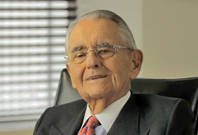 Not that long ago, the U.S. national debt was a buried issue. The government didn’t acknowledge it, and the American public was largely unaware of its size. Today, no matter where on the political spectrum one resides, the debt is openly acknowledged as an important part of public consciousness, in part due to the work of Pete Peterson. This prominent businessman and philanthropist has marshaled his resources—money, passion, influence, and an intense focus—to attempt ambitious change, even though the outcome is anything but certain.
Not that long ago, the U.S. national debt was a buried issue. The government didn’t acknowledge it, and the American public was largely unaware of its size. Today, no matter where on the political spectrum one resides, the debt is openly acknowledged as an important part of public consciousness, in part due to the work of Pete Peterson. This prominent businessman and philanthropist has marshaled his resources—money, passion, influence, and an intense focus—to attempt ambitious change, even though the outcome is anything but certain.
Tackling a big issue
After a long career spanning advertising, business and government, Peterson found himself an overnight billionaire when his investment management firm, The Blackstone Group, went public in 2007. He retired from the business world, and in 2008 established and became chairman of the Peter G. Peterson Foundation, with an endowment of $1 billion devoted to addressing the issues around national debt. Why? Peterson believes that a rising national debt crowds out America’s ability to invest in its future. This belief has fostered his intense focus on lowering the national debt. “Debt is still on pace to reach and exceed 200 percent of GDP, which is well beyond anyone's definition of dangerous and unsustainable,” he writes in a recent statement. To address this deeply complex topic, Peterson is targeting sweeping reforms in the areas of “Social Security, Medicare, healthcare costs, fiscal responsibility, and taxes.” “Now, I’m sure some of my friends are saying privately that this is a very daunting set of missions. ‘Doesn’t the damn fool know how difficult this is?’” he said in a 2009 Philanthropy Roundtable interview. “To them I would say, ‘Well, let’s grant that for a moment. What are your alternatives? To do nothing?’ That is not an alternative. The thought of sitting here and not having tried strikes me as no alternative at all.”See the complete archive of Pete Peterson's videos.
Related Reading
- See a longer article about how philanthropists are innovating in and around government.
- Pete Peterson: Fighting Debt to Preserve America
Raising awareness
The first order of business was raising awareness. Five years ago, neither Republicans nor Democrats wanted to talk about the deficit because the American people did not see it as a priority. “Until awareness grew of how serious the problem was, there wasn’t much chance of making progress,” says Peterson. So, he used his background in advertising to take his message to the American people through a series of public awareness campaigns. He published open letters to the public in The New York Times, supported production of a documentary film about the national debt, and has embraced social media such as Facebook. He even partnered with MTV to air videos targeted at college students.
Identifying solutions
By 2011, public awareness of America’s fiscal challenges had increased dramatically, so the foundation shifted its focus from raising awareness to finding and promoting solutions. Peterson provided grants to six think tanks spanning the ideological spectrum to develop comprehensive plans for addressing the nation’s projected long-term debt and deficits. The Peterson Foundation presented the six plans for discussion at a “Solutions Summit” in Washington whose attendees included former President Bill Clinton, House Budget Committee Chairman Paul Ryan, and four of the bipartisan “Gang of Six” senators—two Democrats and two Republicans—who were preparing a proposal to reduce the federal debt by almost $4 trillion. Peterson continues to use his voice today—most recently with and through the bipartisan Campaign to Fix the Debt—in support of the new Simpson-Bowles Deficit-Reduction Framework.Philanthropy’s role vis a vis government
With the continuing partisan gridlock in Congress, it’s no surprise that Peterson has drawn some ire from opponents who fear that his plan will hamstring economic recovery or prove a boon to the wealthy at the expense of the poor. However, what isn’t up for debate is that Peterson has successfully elevated the issue to one of national prominence. This foots with Peterson’s belief in the power of philanthropy: “Private philanthropy [has] a very important mission in a democracy,” he says, “which is to do those things that the government wasn’t doing that they should be doing; to be an innovator.”For more on Peterson’s work and views on the role of philanthropy and government, see the below links.
Pete Peterson's Key Messages for Other Philanthropists
- Approach solving a problem from multiple angles. Peterson has deployed multiple strategies for addressing the debt crisis, from sponsoring courses on financial literacy to sparking debate on U.S. defense spending. Watch: Pete Peterson approaches the debt crisis from many angles.
- Go public. Don’t forget the role of the public in promoting policy change. Sometimes the first step to change is building public awareness. Watch: Pete Peterson sees an opportunity to build awareness amongst the general public.
- Build consensus. Philanthropy has the opportunity to act as a neutral convener and to bring attention to topics that might not be good for politics. Watch: The power of bi-partisanship.
- Take on challenges that others avoid. The role of philanthropy is to take on the subjects that charity and government won’t, but philanthropists must also make sure that the subject is one into which they can pour their hearts and souls. Watch: Pete Peterson admires philanthropists who take on subjects that others avoid and Pete Peterson’s key decision on his giving.


